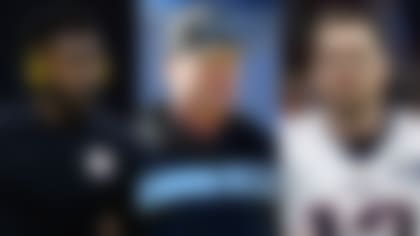NFL Media's Oklahoma Drill series presents exclusive, quick-hitting one-on-one interviews with players and coaches from around the league. No nonsense -- just football experiences directly from the source.
Michael Bidwill
President, Arizona Cardinals
Born: Dec. 6, 1964
Experience: 10 NFL seasons
Interview by Ali Bhanpuri | June 9, 2016
I've been flying since I was 18 years old. I started out in a little single-engine Cessna and built my way up. We've got a couple business jets and I fly both of them.
Since I was a kid, I always had my eyes up in the airand was always interested in aviation. ... Kept flying through school and everything else and continued until today. I probably log about close to 300 hours a year, which is a lot for a guy who doesn't fly as a professional pilot. All the trips back to New York, all the trips for league meetings and NFL games -- that's all me. It's not too often I sit in the back.
think the cornerstone of our success has been the football stadium.University of Phoenix Stadium was the answer that we were looking for for a long time to provide us a great place for our fans to watch the game, for us to play on the field and to give us the revenues to go out and compete. So we've done that. I think the recipe is, we've got great coaching, great key players and a great fan base.
When I look at it today, with Bruce Arians as our head coach and Steve Keim as our general manager, they've done a fantastic job. And I'm sort of part of that leadership team; I need to make sure they have the resources and direction from me of what we want to try to accomplish. And a project like ["All or Nothing"] is something that was really neat, but I wanted to really help expand the exposure for the team. And the way to do it was digitally, and the way to do it was partnering up with NFL Films and creating a collaborative sort of effort.
We didn't want to do "Hard Knocks," but there were some elements of "Hard Knocks" -- the access, wiring people up, cameras -- that were attractive to us. We just didn't want to be cutting players on TV and things like that.
There's a culture of excellence, of accountability. Trust, loyalty and respect are the three words on the back of our T-shirts that the players and coaches wear every day. And I think BA has really instilled that. In terms of what Steve's brought, he's brought a professionalism and a focus on identifying great football players that may not be at the big schools, may not be getting the most amount of coverage. And you look at our drafts and some of the free agents we've signed, a lot of undrafted free agents and players out of Division II schools.
Injuries are a constant part of the business, so you're concerned about injuries. I think keeping the focus and making sure you're building for the future [can be challenges] because the one thing that's constant about teams and the NFL is change, so you constantly got to be planning -- not only for personnel purposes and cap purposes and things like that, but also planning as consumers, as our fans change the ways they want to interact with the team.
Social media was something we didn't even talk about five or six years ago, and now it's a really important part of our business.
Historically, the Cardinals haven't done well on the field until the last few years, and I think we needed -- as we were getting better on the field and getting better in that new stadium -- to make sure we changed attitudes and perceptions about us and our desire to win. And I think we've done that. And I think when you look at the last several seasons, especially, and you look at the direction of the team, I think we're excited about the direction we're going.
I've gathered a lot of advice from a lot of different people, and I think the one piece is I was going to develop my own style, I was going to develop my own way to lead. And I think I needed to have the self-confidence that that was OK to do. And so getting that sort of advice and getting little bits and pieces from different executives and owners in the league, different business leaders in Arizona, different people with football expertise whose opinions I trust, and then putting all those things together and seeing that I've developed my own style at this point -- I think those are the things that were pretty interesting to me.
There are a couple high points. The opening day of University of Phoenix Stadium. I think it was late January of 2009, after we won the NFC championship as a wild-card team -- nobody expected that.
The best game of my life: Super Bowl XLIII, except for the last 36 seconds.
And then, of course, this January was a lot of fun, especially after the divisional game against the Green Bay Packers -- that was unbelievable.
I think [winning a Super Bowl] is all of our expectation. That was our expectation last year and the year before. And so when I look at it, last year, while we had tremendous success -- the most number of wins in franchise history and getting to the championship game -- we really feel like we were disappointed. Proud of the progress we made. But this year our goal is the same thing: Win the Super Bowl, get that ring.
What I'm really excited about [with "All or Nothing"] is players taking off their helmets, and [fans] getting to know our players and getting to know some of the personalities around the Cardinals. And I hope that we bring some fans on board -- not just fantasy football fans that might be following an individual player because of his performance, but also fans of some of our great group of players and coaches.
Carson Palmer. He deserves to have this sort of exposure. He's, first of all, a great leader, a great football player on the field, but he's also really a funny guy. So I'm excited for Carson, because we've done this before. Kurt Warner was a quarterback that people looked past in the league and that was pretty much where I think Carson was coming from. Arizona was a place where they both got their careers back on track.
When we passed that [conduct] policy a number of years ago, that's when I think we took a huge step forward and we really had a culture change across the whole NFL and all the 32 clubs that we're raising the standards and certain conduct is totally unacceptable and it's going to be looked into and people are going to be held accountable for it. But also when I look at the flipside of that, too often it's just one or two players that are creating a bad reputation for other players. ... This is what I love about ["All or Nothing"], 'cause they're going to see what great football players, and great people we have within our organization, and that same thing is true at the other 31 clubs. And it doesn't take one or two bad apples to create a bad punchline in late-night TV about football players. So I'm excited to see the positive bounce that the players get out of this series.
One goal is to push this message down to the colleges and down to the high schools, so we have a consistent, across-the-board message for athletes and young people about what's right and wrong -- domestic violence, sexual assault, all the different matters. We did this with hydration. When hydration became important to the NFL, it became important to the colleges and then to the high schools, and we're hoping the same thing is true here. Same thing with concussions -- when we focus on it, the colleges are focusing on it and youth football is focusing on it.
Pat Tillman is bigger than football, bigger than the Cardinals, bigger than the National Football League. He was a great American, who was also a great football player and a determined person.











